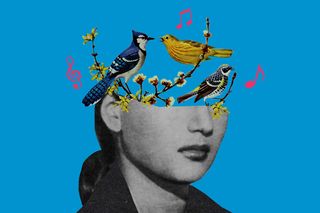
Birdsong Can Reduce Anxiety, Paranoia, New Study Suggests
Researchers recommend it as a mental health intervention, showing how rapid urbanization that risks bird populations impacts human health too.

A new study published yesterday by Nature Scientific Reports throws light on the remarkable healing capabilities of birdsongs. The researchers observed that listening to birdsongs helped alleviate feelings of anxiety and paranoia in humans.
The research comes on the heels of other studies that have explored the relationship between mental health and exposure to nature. Studies have explored how regularly spending a considerable amount of time in nature is directly beneficial to physical and mental well-being. Moreover, some studies also link urbanization to declining mental health. Keeping these in mind, the scientists in the current study set out to find whether the different soundscapes that people were surrounded by played a unique role in affecting their mental health.
For their study, the researchers carried out experiments on a sample size of 295 willing healthy participants. They were exposed to one of four different sounds for 6 minutes — low traffic noise, high traffic noise, birdsong but with minimal diversity, and birdsongs of high diversity. Before and after they were exposed to these sounds, the participants were asked to perform a couple of cognitive and memory tasks and fill out questionnaires on depression, anxiety, and paranoia. “Everyone has certain psychological dispositions. Healthy people can also experience anxious thoughts or temporary paranoid perceptions. The questionnaires enable us to identify people’s tendencies without their having a diagnosis of depression, anxiety, and paranoia and to investigate the effect of the sounds of birds or traffic on these tendencies,” Emile Stobbe, one of the co-authors of the study, told Neuroscience News while explaining the methodology of their study.
On analyzing the data collected, the scientists observed that those who were exposed to traffic noises reported a significant increase in feeling depressed between the two questionnaires. On the other hand, those who were exposed to birdsongs displayed an improvement in their anxiety levels. Furthermore, those who were exposed to the higher diversity birdsong soundscape also reported lower paranoia levels. Finally, they observed that neither birdsong soundscapes nor traffic noise soundscapes had any effect on the cognition levels of the participants.
The findings of the study indicate that birdsongs could be an effective measure to improve the mental health of humans. That the soundscape with a greater diversity of birds resulted in reducing paranoia effectively also highlights the important role that rich biodiversity plays in our lives. Some earlier studies have also looked at the soothing effect that birdsongs have on human health and stress levels.
Related on The Swaddle:
To Save the Great Indian Bustard, Remove Overhead Power Cables, SC Says
Writing for the UK’s Natural History Museum, Tammana Begum explores two theories that may explain why humans are so attracted to birdsongs. The first theory looks at it as an evolutionary preference, suggesting that humans have a genetic preference for nature and wildlife built into their systems, honed over millions of years of living in the wilderness before they began contsructing cities. Birdsongs, then, are sounds which remind humans of this natural home, assuring them of being in a safe environment. The other theory, Begum writes, “suggests nature helps us overcome tiredness as it is an easy, and often pleasant, thing to focus on. It gives us a break from other cognitive challenges in the environment, allowing us to replenish the energy we have lost.”
To the scientists, the findings have opened up new possibilities for approaching mental healthcare, such as taping these soundscapes and playing them in psychiatric wards, and prescribing them to patients. “Birdsong could also be applied to prevent mental disorders. Listening to an audio CD would be a simple, easily accessible intervention,” Stobbe told Neuroscience, before adding, “but if we could already show such effects in an online experiment performed by participants on a computer, we can assume that these are even stronger outdoors in nature.”
That the healing capabilities of these soundscapes in nature could be “even stronger”, is a noteworthy point. Earlier this week, a report by Living Planet warned that wildlife populations saw a 69% decline in population in the last fifty years — all due to human activity. Animals have been hunted and poached for their skin and hide and other valuable body parts, have had to face habitat loss due to urbanization and human expansion, and have often also been killed in accidents or skirmishes with human society. Earlier this month, a video of a rhinoceros in Assam’s Kaziranga National Park went viral, where it could be seen colliding with a truck on a speeding highway inside the national park area. Urbanization and urban expansion are thus doubly harmful for human health as they not only contribute to depressive noise but also threaten the existence of wildlife.
Birds, too, have been affected greatly by rapidly expanding urbanization and industrialization. Beyond the loss of habitat due to rapid human expansion, birds have also faced other problems stemming from urbanization. Last year, Devrupa Rakshit while reporting for The Swaddle noted how increasing noise pollution in cities disrupted birds’ motor, cognitive, and learning abilities. “…when exposed to traffic noise, zebra finches took twice their usual amount of time to forage or to pick up new skills,” Rakshit wrote. Further, light pollution in cities is known to be a major disruptor of the annual migratory journeys of birds, leading to largescale deaths among migratory bird populations. Overhead cables carrying electricity are yet another cause of bird deaths.
The Living Planet report suggests that biodiversity loss due to human activity and the ongoing climate crisis be approached as one integrated problem. Similarly, last month The Swaddle noted how restoring balance in the Ecosystem could go on to benefit not only the wildlife and vegetation but also significantly improve human health. As more and more species are lost to human activity, it is important that there are active efforts toward conserving nature. Otherwise, there could be a time when birdsong would only be accessed through digital media.
Music, then, has healing properties. More so when it comes directly from nature.
Amlan Sarkar is a staff writer at TheSwaddle. He writes about the intersection between pop culture and politics. You can reach him on Instagram @amlansarkr.
Related


Sharing Workplaces With Robots Leads to More Insecurity, Less Productivity in People: Study
